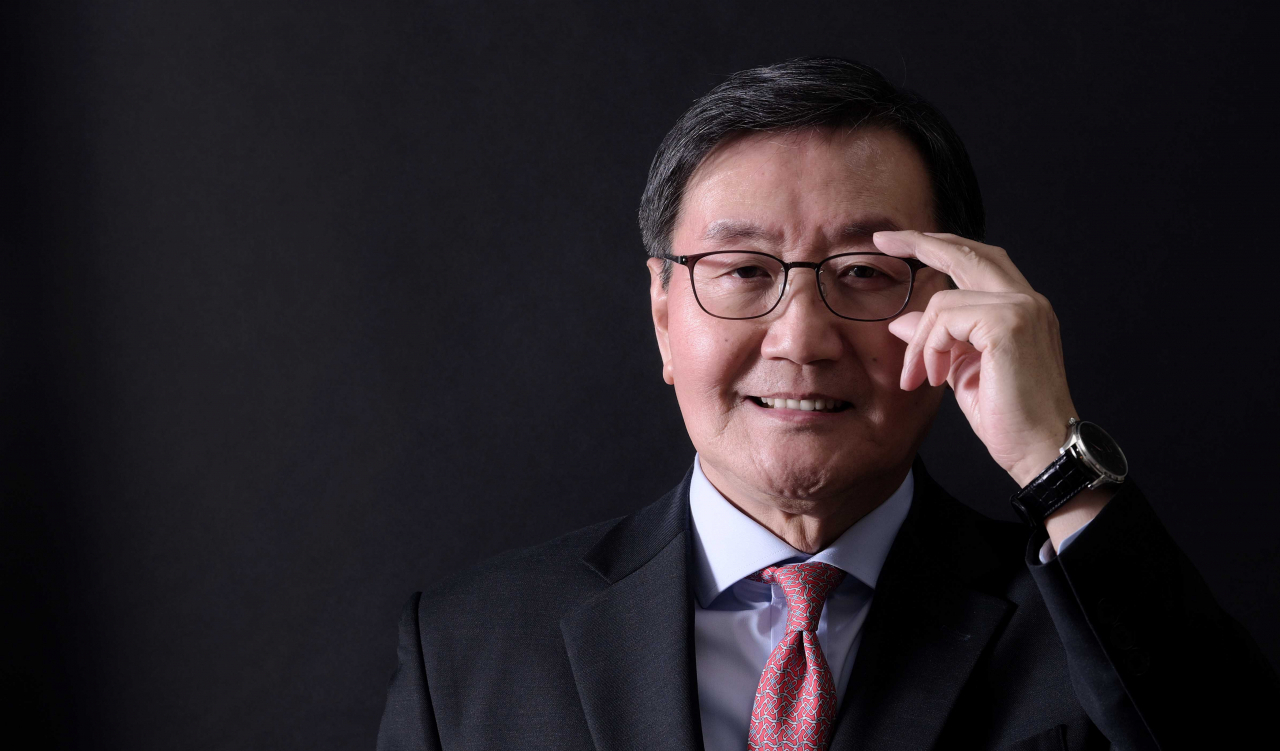Closer ties with US, Japan key to geo-economic challenges
Seasoned financial expert says Korea in need of export diversification, economic vulnerability assessment
By Park Han-naPublished : May 16, 2023 - 15:50

South Korea needs to strengthen its trilateral alliance with the United States and Japan in trade and investment to overcome global geo-economic challenges and supply chain disruptions triggered by COVID-19, said Jun Kwang-woo, chairman of the Institute for Global Economics.
The COVID-19 pandemic and the war in Ukraine have increasingly polarized the world economy, which centers around the US and China. This caused a shift in the global economic paradigm, leading to closer links between national security and the economy.
“As a country that follows liberal democracy and the market economy, it is more important than ever to actively participate in alliances centered on the United States and form alliances with a reciprocal perspective so that Korean businesses can make a soft landing in the post-COVID-19 era,” Jun said during an interview with The Korea Herald ahead of Herald Corp.’s May 24 forum to celebrate the newspaper’s 70th anniversary.
Jun will give a speech at the upcoming forum on “Economic Alliance: Global Geo-economic Challenges and Response Strategies.”
He suggested that South Korea, the US and Japan should strengthen their economic cooperation broadly in four dimensions: trade, investment, international economic governance and the promotion of a sustainable and resilient economy.
“The three countries should strengthen their trade relationships and establish new trade agreements with other countries. This can be achieved by reducing barriers to trade, promoting investment and supporting small and medium-sized enterprises,” he said.
On exports, which have logged an on-year fall since October, Jun said the Korean economy is heavily dependent on core industries such as the semiconductor business as well as its largest export destination, China.
“The scope of exports should be expanded by enhancing the competitiveness of non-core industries and diversifying export destinations,” Jun said.
To expand export partners, utilization of the US-led Indo-Pacific Economic Framework and the Comprehensive and Progressive Agreement for Trans-Pacific Partnership will be helpful, he noted.
South Korea has, on several occasions, expressed its intention to join the CPTPP, a free trade agreement involving 12 Asia-Pacific nations, but has yet to formally request its accession. It joined the 14-member IPEF in May 2022.
Advancing investment in innovation and infrastructure is another area in which the allies could work together, especially in the "strategically important industries such as semiconductors, electric vehicle(s) and artificial intelligence," he said.
"The US is seeking to maintain its dominance in those areas and China is quickly catching up. The trilateral cooperation falls in line with the US' strategy while Korea can sharpen its competitiveness in the industries through the process," he said.
Another possible area for collaboration among the three nations lies in international economic governance to promote fair trade, protect intellectual property and ensure a level playing field for businesses, he said.
Korea, the US and Japan should also promote sustainable development by investing in renewable energy, promoting resource efficiency and supporting sustainable agriculture. “Along with active and safe use of nuclear power, another source of clean energy, this can help reduce environmental risks and facilitate long-run economic growth, contributing to net-zero carbon emission goals,” he said.
Jun is a veteran financial economist who served as the country's first chair of the Financial Services Commission and the National Pension Service. He has worked in private and public positions, including as a professor of finance at Michigan State University, chief financial economist at the World Bank and vice chair of Woori Financial Group.
During the interview, Jun touched upon the pending financial challenges that the country will face.
The Korean economy should be “prepared (for) possible scenarios by identifying its most vulnerable areas when a sense of uncertainty is heightened.”
“One of the biggest concerns we have is the rising risks in the real estate project financing market and heavily indebted small businesses,” he said.
The loans that the five major commercial banks in Korea have deferred to small businesses and small and medium-sized enterprises over the past three years in the aftermath of the COVID-19 pandemic amount to a whopping 37 trillion won ($27 billion).
“In the midst of this, the overall real economy is not in good shape. Exports are also decreasing. So we should thoroughly and preemptively take measures against these downside risks.”











![[Today’s K-pop] BTS pop-up event to come to Seoul](http://res.heraldm.com/phpwas/restmb_idxmake.php?idx=644&simg=/content/image/2024/04/17/20240417050734_0.jpg&u=)





![[KH Explains] Hyundai's full hybrid edge to pay off amid slow transition to pure EVs](http://res.heraldm.com/phpwas/restmb_idxmake.php?idx=652&simg=/content/image/2024/04/18/20240418050645_0.jpg&u=20240419100350)

![[Today’s K-pop] Zico drops snippet of collaboration with Jennie](http://res.heraldm.com/phpwas/restmb_idxmake.php?idx=642&simg=/content/image/2024/04/18/20240418050702_0.jpg&u=)